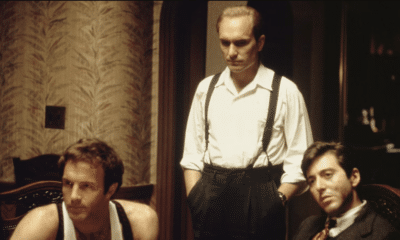News
Gravitating Towards an Oscar: The Music Behind Gravity
With the Oscar nominations out and D-Day drawing closer, things are looking good for Alfonso Cuaron’s Gravity. Tied at top spot with American Hustle at 10 nominations, including best picture, best director and best actress, the movie, which released in October last year, the soundtrack has also been highly lauded. Nominated for best original score, best sound editing and best sound mixing, we take a look at why Gravity’s soundtrack is such a hit.
[newsheader]

Suspended in the vacuum of space
Gravitating Towards an Oscar: The Music Behind Gravity
With the Oscar nominations out and D-Day drawing closer, things are looking good for Alfonso Cuaron’s Gravity. Tied at top spot with American Hustle at 10 nominations, including best picture, best director and best actress, the movie, which released in October last year, the soundtrack has also been highly lauded. Nominated for best original score, best sound editing and best sound mixing, we take a look at why Gravity’s soundtrack is such a hit.

Gravity music composer Steven Price
Doing a music score for a film isn’t an easy process. Musicians in the industry make great songs, but when it comes to placing sound into a visual element, the composer has to understand and take into account a whole range of other factors and contexts to best enhance the auditory experience. Many films have even stood out so much that there is an automatic subconscious connection to the soundtrack when the film’s name is mentioned. Many films in the past, especially sci-fi films, have been successful in this venture, and a flashback to a famous scene from the movie is instantaneous when listening to the soundtrack of ET or Star Wars. Scoring music for film, especially large budget films, is a powerful tool. With a much larger reach than a famous band or troupe, the visual attachment to the music is also a key factor in making the audience remember your songs.
As a film that takes place almost exclusively in space, the director Alfonso Cuaron was very particular that all the sounds are heard from the perspective of the astronauts. George Clooney and Sandra Bullock, who are the only two actors in the film, trot around space for a bit before Bullock finds a way home. The entire soundtrack for this duration, composed by Steven Price, is rich with emotion, but in context to the location and special effects of the movie.
Watching the film in a theatre, one understands how extra time has been put in for the sound. We, as the audience, primarily hear sounds through the protagonist’s spacesuit, which naturally is very different from hearing things on earth. Conceptually, Cuaron and Price worked tirelessly to mimic the kinds of sounds heard in space, ultimately giving the viewer a more immersive experience. Working for almost a full year on the score, which is far above the average time for a Hollywood blockbuster, Price was constantly looking for new sounds and methods of delivering those sounds in space.
[avideo videoid=”Ktp6_4pBBII”]
The most innovative mix was the blurred line between electronic and organic sound that has been incorporated into the film. With pulsating tones put on organic instruments like brass and glass harmonicas, a dynamic emerges that is somewhere between digital and analog. Simple action film effects like explosions are brought out differently in Gravity, relying heavily on the lack of sound in a vacuum. Price, who has previously scored Attack the Block and The World’s End, has reinforced that Gravity doesn’t serve only as the soundtrack, but is indeed completely complementary to the sound effects in the film. Percussion is another aspect that has been cut off from the film. True, there are deep, ominous tones, but no stereotyped percussive beats with crashing cymbals that is generally the dynamics for many Hollywood flicks.
Gravity marks a new strain of music scoring as this style requires a much closer coordination with the script and sound effects of the movie. With such a dramatic shift, there is less emphasis on the songs themselves, and more on the total audio-visual experience. Price composed a last song for the score, the title track that is a more upbeat number with heavy percussion and rising vocals.
Click here to know about some unusual musical winners at the Oscars.
[newsfooter]




































